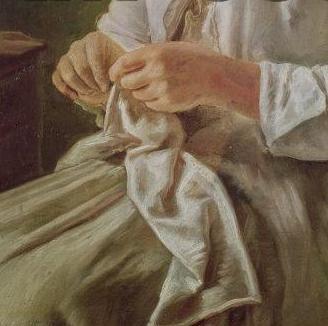Regency Advice for your hands
"Don't you find it colder than it was in the morning, Elinor?...I can hardly keep my hands warm even in my muff." Sense and SensibilityThe following advice is offered from A Manual of Politeness: Comprising the Principles of Ettiquette and Rules of Behaviour in Genteel Society, for Persons of Both Sexes. This charming title was anonymously printed in Philadelphia in 1837, however the advice it offers is timeless.

The Hands
Cleanliness is no less essential to comfort than health, while no one thing is so truly degrading as dirty hands or face in a lady.—It displays, at first sight, a familiarity with very low habits, that is even shocking to the delicacy of the female character, where we naturally look for every outward perfection of appearance that is pleasing and engaging, as the nature of their habits and pursuits is supposed to be of a much more refined order than that of men. In high life, few things more bespeak the true lady and gentleman than the appearance of the hand. Lord Byron has gone so far as to affirm, that a white and delicate hand is a sign of patrician birth. Although I cannot exactly agree in this declaration, yet the attention that is commonly bestowed upon the hands in the upper circles of fashion at once shows the importance that is attached to them.
One assertion may be relied upon in reference to the hands,—the finest and most delicate from nature may be made coarse by neglect; and, vice versa, the roughest fine, by attention. In corroboration, I shall now clearly explain. — The formation of the hand, in the first instance, of course comes from nature, and if not distorted in early life by rough usage and hard work, it of course will retain its form, such as it may be. Hence arises the grand distinction between the hands of gentlemen and artizans. The former, from care and attention, preserve to their hands all the advantages of formation with which nature may have endowed them; while those of the mechanic or artizan are soon distorted in shape and make, rough and coarse, as by their constant use, it may be, in work.
Thus, therefore, the distinction between the hands of the higher and lower orders, arises from treatment, and not nature, as Byron affected to fancy. The most prejudicial habits in early youth, to the hands frequently arise from the learning the piano-forte and harp. The former, particularly, if not well looked to, from the early endeavours of children in stretching the octave, is apt to render the fingers crooked; while the latter, if played without the proper covering to the fingers, thickens and hardens the ends to a most unpleasant extent. A few hints respecting the culture of the hands, may not perhaps be deemed unacceptable. I shall first proceed to show the method of obtaining a soft and white skin, and afterwards of good nails,—the two chief attributes of a lady-like or gentlemanly hand. With regard to the skin, it may be freely remarked, that nothing is so conducive to the preservation of its beauty, as frequently washing in warm water and with fine soaps. Gloves too, by ladies, should always be worn in the house; it is a very elegant fashion, and tends much to preserve the delicacy of the hands. After washing the hands, they should always be rubbed dry; if they be not, the damp left on the skin is apt to turn them red, than which nothing can be more inimical to the pleasing appearance of the hands. 
When, however, the hands have been neglected for any length of time, or have been naturally coarse and of a bad colour, an excellent thing to wash with is oatmeal.—Use it thus: after having well washed the hands in hot water and soap— fine soap, for there is less alkali in its composition than the common,—take some of the meal in the hands, and after wetting it, keep rubbing them together some time, then dry them well with a coarse towel. By this means the uneven surface of the skin gradually becomes softened, and the colour will be found improved. An excellent recipe for giving a temporary whiteness to the hands, is the juice of lemons. A very common notion prevails that the use of oil and wax, and sleeping in kid gloves, refines the hands—a practice that is not only very unhealthy by preventing the proper circulation of the blood, but inefficacious in every respect. Next to colour, the nails most attract the attention to the hand.
Those that are considered the handsomest, are the filbert-shaped, so termed, from their resemblance to the fruit so called. In the care of the hand, the nails require much attention. The too frequent blemish to the nails are white spots, and the undue growth of the skin immediately round the nail. The Circassians have a pink dye, in which senna forms a principal ingredient, to remedy the first of these blemishes; but the exact recipe used, is unknown in this country. With regard to the thickness of the skin that skirts the nail, it is frequently occasioned by the injudicious use of the scissors or penknife, in trimming the nails: for to cut it off is to increase the defect by causing accelerated growth. The only method that presents itself of keeping it under, is by the free and frequent use of a hard nail-brush, the use of hot water, and the employment of a corner of the towel in turning it back every time you wash. If this treatment be continued for any length of time together, it will rid the fingers of the hardest skin, by means of keeping up a brisk circulation in the hand, in which alone consists the art of obtaining and keeping the skin of the hand fine, as it calls into action all the minute pores and their secretions, thus rendering it smooth and soft. With regard to soaps, I have heard many very high encomiums bestowed upon Rigge's scented soap, for the pleasing effect it has in softening and whitening the skin.
Chapped Hands
There is not a more common or more troublesome complaint in the winter season, especially with females, than chapped hands. It is rather remarkable that few individuals seem to know the true cause of this affection. Most people attribute it to the use of hard water, and insist upon washing, on all occasions, with rain or brook water. Now the truth is, that chapped hands are invariably occasioned by the injudicious use of soap; and the soap affects them more in winter than in the summer, because in the former season the hands are not moistened with perspiration, which contracts the alkaline effects of the soap.
There is a small portion of alkali in hard water, but not so much as there is in soft water, with the addition of soap. The constant use of soap in washing, even though the softest water be used, will cause tender hands to be chapped, unless some material be afterwards used to neutralize its alkaline properties. In summer the oily property of the perspirable moisture answers this purpose; but in winter, a very little vinegar or cream will, by being rubbed on the dried hands, after the use of soap, completely neutralize its alkaline properties, and thereby effectually prevent the chapping of the hands. Any other acid or oily substance will answer the same purpose.
There are some very delicate hands which are never chapped. This exemption from the complaint arises from the greater abundance of perspirable matter which anoints and softens the skin. Dry and cold hands are most afflicted with this complaint.
Enjoyed this article? If you don't want to miss a beat when it comes to Jane Austen, make sure you are signed up to the Jane Austen newsletter for exclusive updates and discounts from our Online Gift Shop.



Leave a comment
This site is protected by hCaptcha and the hCaptcha Privacy Policy and Terms of Service apply.